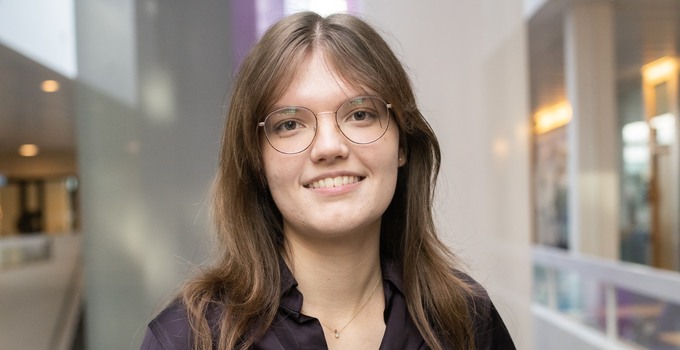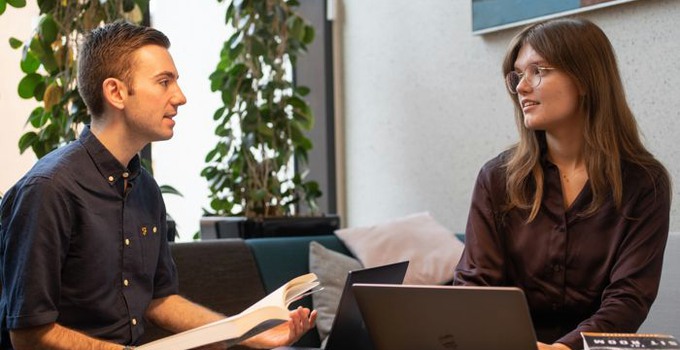
Unraveling the puzzles of politics, security and crisis
Aino Esser bridges a liberal arts background with specialized security studies at the Swedish Defence University. Throughout her academic journey, she has followed one principle: "Embrace the mess."
After completing her bachelor's degree in liberal arts, Aino has started her journey into specialized security studies at the Swedish Defence University. In a time of complex international relations and geopolitical challenges, she advocates for cultivating curiosity and getting comfortable with uncertainty.
Her academic journey started at the University College Maastricht, which led her to the Swedish Defence University.
Can you share about this choice and its appeal?
– During my bachelor's studies, I became drawn to social science and particularly international politics. Studying courses on critical security and Sino-American relations research, I stumbled upon a compelling article by Linus Hagström. He was the East Asia Programme Director at the Swedish Institute of International Affairs and is now a Professor at the Swedish Defence University. His article inspired me to explore the university's unique mix of military and civilian perspectives in international relations. After learning more about the program and its specialized knowledge in security studies and the political psychology of decision-making, it seemed like the next logical step in my academic journey.
How did you feel when you learned you were accepted into the program?
– The moment that acceptance from the SEDU came through, it felt as if everything clicked into place. There's something about saying, 'I'm studying at the Swedish Defence University,' that has always brought a smile to my face. It has a great ring to it.
You've mentioned an intrigue in politics, security, and particularly in disruptive events. Can you elaborate on this passion?
– I've always been intrigued by crisis management in big power politics. Moments where political psychology, public policy, and international relations intersect offer significant insights. Disruptive events captivate me because they challenge our perceptions and expectations. They force us to ask questions like 'How did we miss this?'. My passion stems from tackling these events, finding pathways through them, and pushing society forward.

International Masters' students Duncan Cooper och Aino Esser. Photo: Carl Carpelan.
Any personal experiences that shaped your academic path?
– A dear friend with a deep interest in military history expanded my views on state power dynamics. While my initial leaning was towards state narratives, her enthusiasm gave me a balanced perspective on security and crisis management.
What courses have especially excited you, and have there been any academic challenges during your study?
– I’m looking forward to next week’s war gaming session, even though it's nerve-wracking. I'm also eager for the course on the political psychology of decision-making and policy-making. The crisis management exercises here have been a shift from my theoretical past, providing deep insights into how I react under pressure. On the flip side, a take-home exam I’m working on has me a bit on edge. Although presentations can be daunting, they typically pan out well. For me, challenges are less about achieving perfection and more about maintaining enduring curiosity.
What are your future aspirations?
– My passion lies in East Asian politics. Combining this with my love for the Japanese language and security studies seems like the natural next step for me. I'm exploring opportunities in think tanks, global organizations, or perhaps pursuing a deeper academic dive.
Do you think there's a particular type of personality best suited for your field of study?
– This field requires a comfort with uncertainty and an understanding that answers aren't always straightforward. A burning curiosity about political dynamics and staying updated with global events are crucial. Students here come from diverse backgrounds, including human rights advocates to military veterans. I believe that diverse perspectives, from disciplines like philosophy or cultural studies, enrich our understanding of security studies. My advice? Even if it feels messy, jump in and add your touch to the field.
More about the International Masters' programme Politics, security and crisis
Quick Facts about Aino Esser:
Age: 24
Nationality: Half German, half Finnish
Birthplace: Lidingö, Sweden
Studies: Politics, Security, and Crisis at the Swedish Defence University
Inspiration: Her mother and new friends met in the Netherlands and Japan who inspired her to pursue her passions.
Favorite hangout: The Officers mess, a bar in an old building on campus, is my go-to place on Wednesdays and Thursdays for drinks and profound conversations with fellow students.
Extracurricular activities: Attending a Swedish course and making use of the free yoga sessions and gym, all sponsored and provided by the university.
Recommended reads: 'Very Short Introduction' series by Oxford, "When We Cease to Understand the World", "The Politics of Crisis Management".
Personal mantra: "Embrace the mess."
More about
Page information
- Published:
- 2023-10-19
- Last updated:
- 2024-07-18
